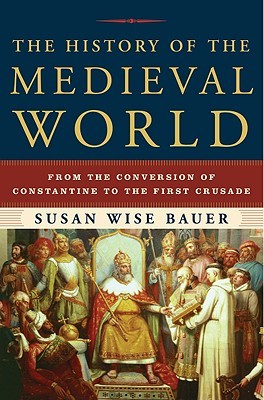This week I'm taking a look at another incredibly ambitious book, The History of the Medieval World. Although this week's book deals with only about seven or eight hundred years of history, opposed to last week's two thousand years, it's still fairly ambitious in its scope as it attempt to talk about everything going on in the world rather than focusing on say, just the pope. And yet at the same time the book feels somewhat inadequate because it takes an almost shotgun approach. I'm left wondering if this was meant to be a textbook for classes rather than a historical monograph considering how broad and shallow its focus is.
The word that best describes this book is ambitious, and I think in trying to at least touch upon absolutely everything over some seven centuries of history is an incredibly difficult task. The result is I feel like Bauer has bitten off more than she can chew because the results feel a little muddled. There's also an argument that surfaces from time to time in the book that religion becomes just one more tool of the state to wield power, starting with Constantine's incorporation of Christianity in the Roman Empire and Bauer argues reaches its ultimate denouement in the First Crusade. Now, to completely ignore religion during the Medieval period, especially the spread of Christianity and later the birth and spread of Islam, would be to completely ignore a key aspect of social and political structures during this time period. However, I don't think Bauer spends sufficient time making her arguments coherently and the inclusion of India, China, Korea, and Japan only muddy the waters further.
One of the areas where I felt Bauer got too ambitious was trying to include Asia in her analysis and a very limited analysis of the Americas as well. To be fair, traditional histories which are almost entirely reliant on written records are largely blind when it comes to American civilizations whose writings have largely been lost, destroyed, untranslated, or never existed in the first place. Much of our understanding of those civilizations comes from archaeological research, which involves more than a little guesswork. However the cultures of Asia did have writings during this time period and extremely rich and detailed history. While Bauer goes into these cultures at various points, the lion's share of focus seems to remain in Europe and the Mediterranean.
Now, are Euro-centric histories a problem? Yes. Europe has dominated ''standard histories'' for generations and trying to include cultures from across the globe into more standard history curricula is an ongoing challenge. After all, I know infinitely more about Europe than I can tell you about almost any other place on the globe. But it definitely feels like Asia as a continent gets less attention than Europe and the Americas get practically no attention at all. The fact that sub-Saharan Africa is excluded entirely from this narrative is particularly jarring. I honestly think the book might have been better served by focusing on the main area of interest: Europe.
A challenge I did have was also the sheer amount of names and information included in this book. When you're dealing with dozens of geographic locations, scores of countries, and hundreds of people it can be very difficult to keep track of them all. Especially when you're listening to the book rather than reading. That being said, I learned quite a few things, especially about places like the Byzantine Empire that I don't necessarily know too much about, which was pretty interesting. It's a very shallow overview, but there are some good things to learn in here.
Overall, the book's okay but I think it has a few problems. The religion as a tool of government argument crops up a couple of times but I feel like Bauer doesn't articulate her argument well enough to make it really stick. The inclusion of non-European cultures is nice, but they're largely presented in isolation of Europe rather than how they or Europe may have influenced each other. The inclusion feels incomplete and as I said, the lack of anything about Africa is especially concerning in light of what else is included. I can't think of any good overviews that throw their nets as broadly, but I can think of some that stay far more focused.
- Kalpar


No comments:
Post a Comment